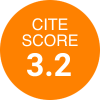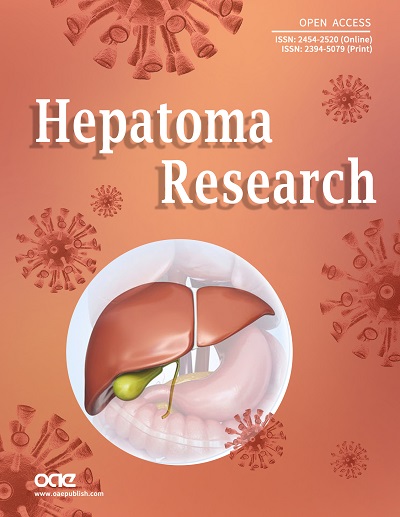
Topic: Advancing Immunotherapy and Tumor Microenvironment Research in Hepatocellular Carcinoma
A Special Issue of Hepatoma Research
ISSN 2454-2520 (Online) 2394-5079 (Print)
Submission deadline: 10 Apr 2025
Guest Editor(s)
Special Issue Introduction
The liver, a crucial immune organ maintaining systemic homeostasis, exhibits a relatively high level of immune tolerance, particularly toward foreign antigens. In recent years, immunotherapy, especially immune checkpoint inhibitors and other novel immune-based approaches, has significantly revolutionized cancer treatment paradigms. However, the complex and heterogeneous nature of the tumor microenvironment (TME) in hepatocellular carcinoma (HCC) presents significant challenges to therapeutic efficacy, highlighting the urgent need for a deeper understanding of the mechanisms underlying immune evasion in HCC. This Special Issue focuses on the latest advances in immunotherapy and TME research for HCC, particularly the interactions between immune cells, stromal components, and tumor cells, which collectively shape the tumor's response to treatment.
The TME in HCC is characterized by its dynamic and immunosuppressive nature, often marked by immune cell infiltration, fibrotic tissue, and tumor-associated macrophages (TAMs), which can impede the effectiveness of immunotherapy. Multi-omics approaches to analyze the immune microenvironment of HCC have emerged as a key strategy to better understand immune resistance and the limitations of immunotherapy. These studies aim to uncover the complex molecular interactions between tumor cells, immune cells, and stromal components, providing deeper insights into how the TME evolves in response to treatment. By identifying these mechanisms, researchers hope to discover new biomarkers and therapeutic targets that could enhance immunotherapy efficacy and potentially sensitize tumors to treatment.
In addition to immune checkpoint inhibitors, cell-based therapies such as CAR-T, NK cell, and TIL therapies are gaining increasing attention in HCC treatment. CAR-T cell therapy modifies T cells to target specific antigens on HCC cells, such as glypican-3 (GPC3). Although promising results have been observed in preclinical studies, challenges related to the liver's immunosuppressive environment need to be addressed. NK cell therapy employs natural killer cells, which can kill tumor cells without prior sensitization. By enhancing these cells and combining them with immune checkpoint inhibitors, researchers hope to overcome the immune suppression within the liver. TIL therapy involves expanding tumor-infiltrating lymphocytes (TILs) from the patient's own tumor; however, their activity is often limited by the tumor microenvironment. Overall, combining cell-based therapies with other treatment modalities holds the potential to improve therapeutic outcomes in HCC.
This Special Issue will explore the latest advancements in immunotherapy for HCC, including immune checkpoint inhibitors, CAR-T cell therapies, and combination strategies that target both the immune system and the TME. Furthermore, we will delve into the molecular and cellular components of the TME, as well as the role of tumor-associated inflammation in immune evasion. These insights are crucial for identifying novel biomarkers and therapeutic targets, with the aim of developing personalized treatments that can improve survival outcomes for HCC patients.
We invite contributions from researchers in various fields addressing the diverse aspects of immunotherapy and the TME in HCC, ranging from basic science to clinical trials. The goal is to foster interdisciplinary collaboration to accelerate the development of more effective and personalized therapeutic strategies. This Special Issue will provide a comprehensive overview of the current landscape and future directions in HCC immunotherapy, offering valuable insights into how we can harness the immune system to combat this devastating disease.
As research in liver immunology and HCC treatment continues to evolve, it is essential to focus on strategies that can both restore immune surveillance and modulate the TME to promote more effective anti-tumor responses. This Special Issue aims to bring together the latest research, clinical trials, and emerging therapies, fostering collaboration among experts in immunology, oncology, and hepatology. We invite contributions that address the diverse challenges and opportunities in HCC immunotherapy, with the goal of advancing our understanding of how to better harness the immune system to fight this formidable disease.
Potential topics include, but are not limited to, the following:
1. Immunotherapy for Hepatitis B Virus-Related Hepatocellular Carcinoma;
2. Adverse Reactions in Hepatocellular Carcinoma Immunotherapy;
3. Biomarkers in Hepatocellular Carcinoma Immunotherapy;
4. The Role of Gut Microbiota in Hepatocellular Carcinoma Immunotherapy;
5. The Impact of Metabolic Reprogramming on the Tumor Microenvironment in Hepatocellular Carcinoma;
6. Mechanisms of Hepatocellular Carcinoma Cells in Reprogramming the Tumor Microenvironment;
7. Advances in Immunotherapy for Metabolism-Associated Fatty Liver Disease (MAFLD)-Related Hepatocellular Carcinoma;
8. The Role of Various Tumor-Associated Cell Types in the Immunosuppressive Tumor Microenvironment of Hepatocellular Carcinoma;
9. The Impact of Intercellular Interactions on Immunotherapy in the Hepatocellular Carcinoma Tumor Microenvironment;
10. Exploration of Combination Treatment Strategies Based on Immunotherapy for Hepatocellular Carcinoma;
11. Application of CAR-T in Hepatocellular Carcinoma Immunotherapy;
12. Regulation of Immune Checkpoints in the Hepatocellular Carcinoma Tumor Microenvironment;
13. Application of Immunotherapy-Based Neoadjuvant Treatment in Hepatocellular Carcinoma.
Submission Deadline
Submission Information
For Author Instructions, please refer to https://www.oaepublish.com/hr/author_instructions
For Online Submission, please login at https://oaemesas.com/login?JournalId=hr&SpecialIssueId=hr241219
Submission Deadline: 10 Apr 2025
Contacts: Victoria Lee, Managing Editor, VictoriaLee@oae-publish.com








